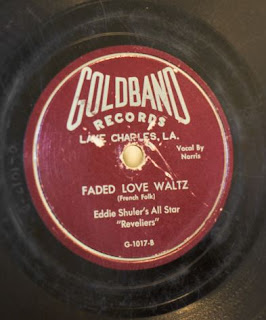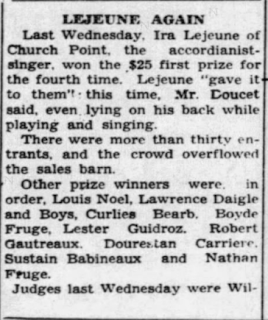Eddie Shuler spent much of the 1940s filling in western swing groups and Cajun string bands such as the Hackberry Ramblers. By the end of WWII, he managed to assemble his own group called the Reveliers and decided a new record label was needed in order to promote his new group. In doing so, he couldn't ignore the sudden increased demand for Cajun music. Eddie was surrounded by Cajun people who wanted more of those records. His band had to adapt to the music demand. He recalls:
Oh yes, I sold a lot of records to the jukebox operators; that was where you sold most of your records in those days. There were not all that many record shops, and then the people didn't have all that much money to buy records, except the richer people. That's where you sold most of those pop records. But the jukebox operators had to have what they called race records and hillbilly records; they had to have that stuff and the Cajun records, too. So we got into the Cajun thing.1
Oh, chère, mais, j'ai prié, mais, pour t'avoir,J'ai pas vu, joli 'tite monde, comment je vas faire.Oh, chère, mais, quel espoir, mais, que tu connais,Moi de mourir de plus t'avoir, joli 'tit monde.Oh, chère, mais, pourquoi-donc, mais, (.........),Tu vas voir que je mérite pas tout ça tu m'fais.
Shuler wanted to record his own songs and focus more on hillbilly music, like his main influence, Bob Wills. He explained:
Between 1944 and 1945, Shuler cut the first record for the Reveliers, featuring Shuler's compositions "Broken Love" and "Room in Your Heart For Me Darling." By 1946, Cajun music was ramping up among the population of south Louisiana and he brought in Norris Savoy to assist in singing some classic Cajun songs. Along with Pee Wee Lyons on steel guitar and Johnny Babb on bass, they recorded the melody of the 1936 "Ma Valse Favori" by Cleoma Breaux in which he entitled it "Faded Love Waltz" (#1017). The melody is the same as Lawrence Walker's 1929 recording of "La Vie Malheureuse" and Happy Fats' 1935 recording of "La Valse De L'Amour". Shuler called his new record label Goldband Records.
Any country band was hillbilly. It didn't make no difference who you were, you were hillbillies. There wasn't no country music then. They hadn't even invented the word.2
Between 1944 and 1945, Shuler cut the first record for the Reveliers, featuring Shuler's compositions "Broken Love" and "Room in Your Heart For Me Darling." By 1946, Cajun music was ramping up among the population of south Louisiana and he brought in Norris Savoy to assist in singing some classic Cajun songs. Along with Pee Wee Lyons on steel guitar and Johnny Babb on bass, they recorded the melody of the 1936 "Ma Valse Favori" by Cleoma Breaux in which he entitled it "Faded Love Waltz" (#1017). The melody is the same as Lawrence Walker's 1929 recording of "La Vie Malheureuse" and Happy Fats' 1935 recording of "La Valse De L'Amour". Shuler called his new record label Goldband Records.
It had something to do with my mentality. I said, 'This is going to be a goldmine, so I'll just call it Goldband.'2
Oh, dear, well, I prayed, well, to have you,I couldn't see, pretty little everything, how I'll do this.Oh, dear, well, what hope, well, that you know,I'm dying to have you anymore, pretty little everything.Oh, dear, well, so why, well, (........),You'll see that I don't deserve all that you've done.
- Record Makers and Breakers: Voices of the Independent Rock 'n' Roll Pioneers By John Broven
- http://theind.com/article-168-the-record-man.html
- Lyrics by Stephane F
Hey Cushmall | Goldband G-1017-A
Faded Love Waltz | Goldband G-1017-B
Find:
Eddie Shuler & His All Star Reveliers: Grande Mamou (BACM, 2016)




















